Fest cancellations, mixed-up results, unemployment slowdown: News from around our 50 states
Alabama
Montgomery: The state prison system said Wednesday that a second inmate has died after testing positive for COVID-19 as the number of cases among inmates and staff continued to rise. William Hershell Moon, a 74-year-old inmate at St. Clair Correctional Facility, died Wednesday at a hospital. “The Alabama Department of Corrections extends its sympathies to the Moon family and his loved ones during this difficult time,” the prison system said in a statement. The prison system said four other inmates housed in the same small living area as Moon also tested positive for COVID-19. That living area within St. Clair’s infirmary is on level-two quarantine, and the entire infirmary at St. Clair remains on level-one quarantine, the prison system said. A total of 19 inmates have tested positive for the novel coronavirus, according to the prison system. Ten of those are currently ill.
Alaska
Kenai: Three members of the Nikiski Fire Department have tested positive for COVID-19, and eight others were in quarantine pending test results, a spokesperson for the Kenai Peninsula Borough said Wednesday. Brenda Ahlberg said the 11 individuals were part of one shift. The borough’s emergency management office, in a release, said testing has been conducted for all department personnel. Ahlberg said that includes full-time staff and volunteers. Nikiski Fire Chief Bryan Crisp said the department will continue to follow federal health protocols and recommendations from the borough’s physician director, which include wearing protective gear and cleaning equipment. Personnel from other departments have agreed to help the Nikiski department, the release said. The local public health department is investigating the cases as part of efforts to determine whether others may need to be tested, KSRM radio reports.
Arizona
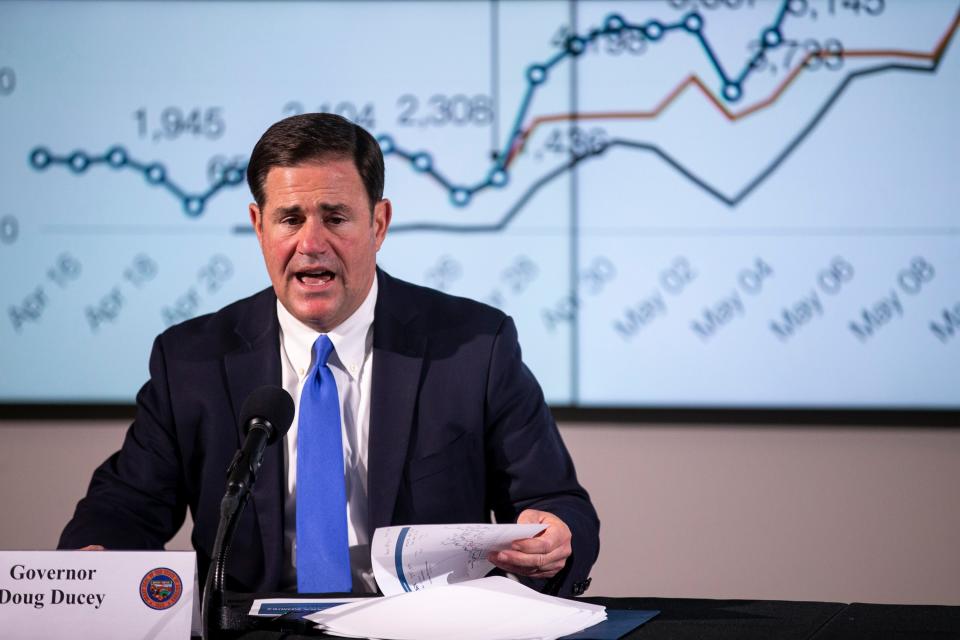
Glendale: State officials reported nearly 1,000 new coronavirus cases Wednesday amid a recent surge in hospitalizations, a little over two weeks after Gov. Doug Ducey ended his stay-at-home order. The surge of new cases of COVID-19 is a troubling sign for former state health director Will Humble, who said the timing is too close to be coincidence. “The one thing it does is it shows us that the stay-at-home order worked,” Humble said. “Because when it ended you see an increase in cases on the 26th, which is 10 days after it ended. You can look at it county by county by county and see the same thing.” The current director of the state Department of Health Services, Dr. Cara Christ, said there are other factors that could account for some of the increase, including greater testing. But she acknowledged the stay-home order’s end likely played a role.
Arkansas
Little Rock: The state’s number of cases continued to rise Wednesday of the illness caused by the coronavirus outbreak, and officials say six more people have died. The Health Department said at least 8,067 people in the state have tested positive for the virus, an increase over the 7,818 reported Tuesday. The number of active cases, excluding those who have died or recovered, reached a new high of 2,208. The true number is likely higher because many people have not been tested, and studies suggest people can be infected and not feel sick. The number of people who have died in Arkansas from COVID-19, the illness caused by the virus, rose from 136 Tuesday to 142. Arkansas’ active cases have increased since late May as businesses that had closed because of the pandemic have been allowed to reopen. The state has also increased testing in recent weeks.
California
Sacramento: Democratic legislative leaders have agreed on a budget they say covers the state’s estimated $54.3 billion deficit while avoiding most of Gov. Gavin Newsom’s proposed budget cuts to public education and health care services. The budget appears to hew many of Newsom’s expectations, including relying on the expectation that California will get significant federal funding to address the economic fallout of the coronavirus pandemic. It also includes Newsom’s proposed tax increase on some businesses, which is forecast to generate $4.4 billion annually, although it rejects $8 billion in cuts to public education Newsom included in his plan. If the federal money does not materialize, school districts would have to defer about $9 billion in costs to future years by borrowing or using reserves.
Colorado
Aurora: The Aurora Police Department announced Wednesday that officers are searching for three people suspected of violently attacking a woman in Target after the shopper asked the group to grant her more social distance. A man and two women bumped into the shopper inside the Target in Aurora on May 8 before the shopper then asked the group to give her more space, The Aurora Sentinel reports. The group began accosting the shopper and threw a box of tissues at her head before continuing to beat her, investigators said. The shopper suffered multiple broken bones. All three suspects, believed to be in their late teens to late 20s, were captured on surveillance footage leaving the store in a dark red SUV, authorities said. Police have encouraged anyone with any information to contact local authorities. Social distancing guidelines have been implemented to prevent the spread of COVID-19.
Connecticut
Hartford: Some struggling immigrant families in the state without legal status will receive a share of $3.5 million in public and private money for COVID-19 relief. Democratic Gov. Ned Lamont announced Wednesday that $2.5 million in state-funded grants to landlords will be provided on behalf of renters who are ineligible for similar aid under the federal CARES Act. Additionally, the nonprofit philanthropic organization 4-CT plans to make $1 million – in the form of one-time debit cards in denominations of $200 or $400 – available to Connecticut families excluded from federal relief programs. Grassroots immigrant rights groups will help identify families for the financial assistance and send them to local clinics, where medical staff will first offer COVID-19 testing before providing the debit cards. The state has prioritized the testing of densely populated urban centers to keep track of future outbreaks of the coronavirus.
Delaware
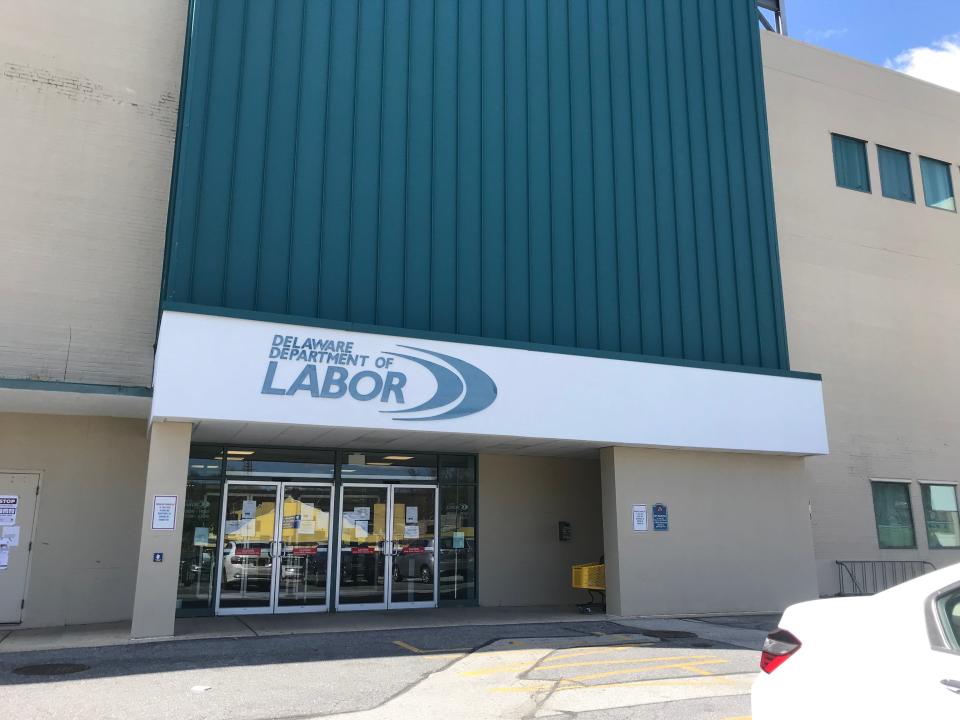
Dover: The number of initial unemployment claims filed by Delawareans fell again last week to its lowest level since before the coronavirus pandemic struck. The Delaware Department of Labor reported Thursday that 3,052 initial unemployment claims were filed for the week ending May 30. That’s six times less than the number of claims filed in both the last week of March and the first week of April. Officials said more than 103,500 initial jobless claims have been filed since March 15 and more than $327 million in unemployment benefits paid. That total includes $209 million in federal funds and $117.5 million from Delaware’s unemployment insurance trust fund. By comparison, the fund paid out a total of $59 million in 2019. Jobless claims soared after Democratic Gov. John Carney imposed wide-ranging restrictions and closures on businesses in an effort to stem the spread of the virus.
District of Columbia
Washington: Georgetown aims to give pedestrians more room for social distancing by removing some street parking to make sidewalks wider, WTOP-FM reports. Several times in the past, the neighborhood has temporarily widened M Street and Wisconsin Avenue sidewalks for weekend events by using portable crowd control barriers. But that won’t work for longer-term plans.
Florida
Orlando: The city’s First Presbyterian Church has made a donation of more than $500,000 to Central Florida’s nonprofits to help ease some of the economic devastation caused by the coronavirus. The church pooled money from from virtual collection plates and used leftover funds from a capital campaign, bequests and an annual missions drive, Senior Pastor David Swanson said. “We have what we call our Good Samaritan Fund to help people pay the light bill, pay the rent, make a car payment, pay the mortgage,” Swanson told the Orlando Sentinel. “Normally we get three, maybe four requests a month. But since COVID started, we’ve had 170. People are desperate.” In addition, church officials decided to support the region’s nonprofit agencies that feed, shelter and serve the tens of thousands of Central Florida workers who have been furloughed or laid off. Checks ranging from $5,000 to $50,000 will go to 14 charitable agencies in the area.
Georgia
Atlanta: The Legislature will resume session June 15 under an agreement announced by House and Senate leaders Wednesday. The 40-day legislative session was put on hold in March because of the coronavirus pandemic. House Speaker David Ralston and Lt. Gov. Geoff Duncan announced the start date in a letter to members. Ralston and Duncan had to agree on when to restart under the terms of the resolution that halted the session March 13. The two previously had differing opinions on when to restart. When lawmakers reconvene, one of their biggest tasks will be grappling with a state budget that has been turned upside down by the pandemic. There have also been calls for Georgia to enact a hate crime law.
Hawaii
Honolulu: Members of the U.S. military arriving in Hawaii will not be subjected to the state’s quarantine rule resulting from the coronavirus pandemic, but service members will follow a separate order restricting their movements. The Department of Homeland Security exempted military members from the state’s quarantine guidelines for arriving travelers, The Honolulu Star-Advertiser reports. But the U.S. Indo-Pacific Command, which oversees operations in the state, said its own “restriction of movement” guidelines prohibit service members from going out for 14 days except for travel to places considered essential, such as grocery stores, doctors or pharmacies. The military order is less restrictive than the requirements for arriving civilian residents and tourists, who are required to stay in a dwelling for 14 days without traveling into the community.
Idaho
Boise: Federal officials on Thursday announced that a northern Idaho county with a drug-trafficking problem will be included in a regional enforcement network and will face a crackdown. The U.S. Drug Enforcement Administration designated Kootenai County as part of the Idaho/Oregon High Intensity Drug Trafficking Area. The designation means that law enforcement agencies will get federal grant money and that federal, state, local and tribal police will be better able to coordinate activities and share information. “We will focus on drug traffickers, not users,” said Idaho State Police Capt. John Kempf. “Dealers – people who make money off the misery of people who are addicted to drugs.”
Illinois
Chicago: Three members of the Legislature want lawmakers to return to Springfield for an emergency legislative session to address criminal justice reform and rebuilding communities in the wake of “protests and subsequent civil unrest” in recent days. The Chicago Sun-Times reports that in a letter to House Speaker Mike Madigan and Senate President Don Harmon, Reps. Kam Buckner, Curtis Tarver and Lamont Robinson, all Democrats, say communities can’t wait until the fall veto session to address the unrest resulting from the killing of George Floyd in Minneapolis. “We are in a state of emergency and need to act immediately,” the lawmakers wrote. The COVID-19 pandemic has kept the General Assembly from Springfield, with lawmakers meeting in May for a four-day session to pass a budget and other legislation. At the time legislators adjourned May 24, Harmon said he didn’t think anyone was eager to return for a special session.
Indiana
Indianapolis: The state had about 24,000 people apply for unemployment benefits last week, following the national trend of slowing job losses after coronavirus-related business closures started in mid-March. Some 240,000 Indiana residents received jobless aid for the week ending May 23, according to U.S. Department of Labor statistics released Thursday. That is down from the peak of nearly 295,000 in early May just before statewide business and travel restrictions started being eased but still more than 10 times the level of early March. Gov. Eric Holcomb on Wednesday signed a 30-day extension of the state’s public health emergency until July 4, when he expects to lift most limits on businesses, large gatherings and entertainment activities. Indiana had the country’s fifth-highest unemployment rate for April at 16.9%, topping the national rate of 14.7%.
Iowa
Des Moines: Republican state lawmakers proposed a bill Wednesday that would offer broad protection from coronavirus lawsuits for doctors, hospitals, nursing homes, meatpacking plants, restaurants and other businesses. The measure, which is retroactive to Jan. 1, 2020, was tacked onto a medical malpractice bill that previously had passed the Senate. After swift passage in a House subcommittee and committee Wednesday, it’s eligible for House floor debate. If approved in the House, the Senate only needs to agree with the new language, and it would go to the governor for her consideration. Democratic Rep. Brian Meyer, a lawyer, unsuccessfully attempted to amend the measure to require business owners to prove they followed government guidelines and federal and state laws to get protection from lawsuits.
Kansas
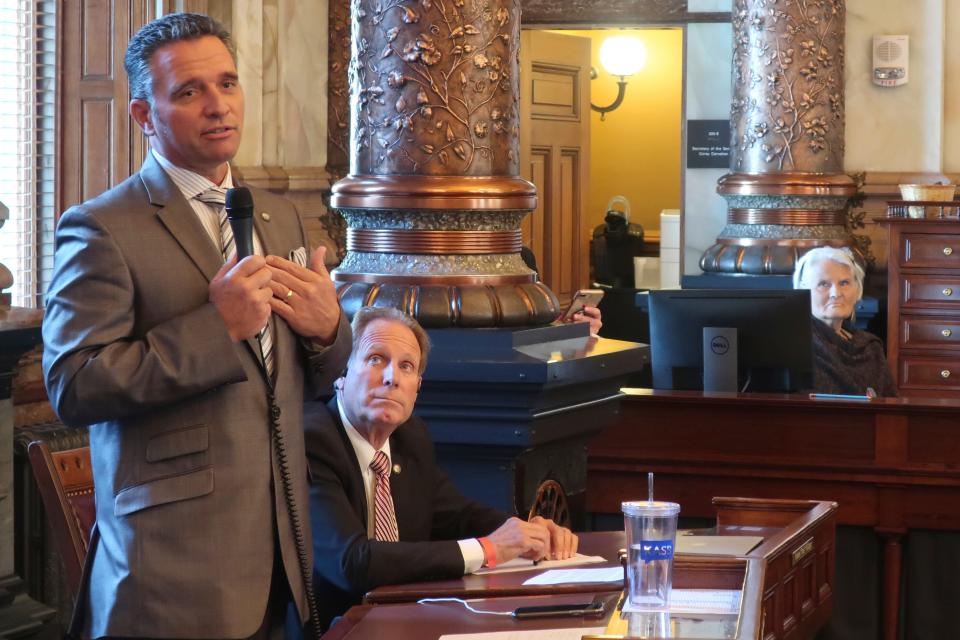
Topeka: A bill giving lawmakers some oversight of the state’s coronavirus response cleared the House on Wednesday night and is headed to the Senate. The Legislature convened for a special session called by Gov. Laura Kelly after she vetoed a sweeping coronavirus bill GOP lawmakers approved in May moments before adjourning their annual session. That measure would have curbed Kelly’s power to direct the state’s pandemic response; given legislative leaders the final say over how $1.25 billion in federal relief funds are spent; and protected businesses, medical providers and nursing homes from lawsuits. Kelly’s staff and top Republicans have been negotiating since then. GOP lawmakers unveiled a new plan Tuesday that also would give legislators oversight of spending, prevent coronavirus-related lawsuits, and limit Kelly’s ability to close businesses statewide this fall and winter. The vote in the House was 107-12.
Kentucky
Frankfort: A 9-month-old who tested positive for COVID-19 was among eight more people whose deaths were related to the coronavirus in Kentucky, Gov. Andy Beshear announced Wednesday. The latest deaths raised the statewide death toll to 450 since the pandemic began. In announcing the infant’s death, Beshear said: “Far too often, people think that it’s something that only happens to medically compromised seniors. This is a reminder of how deadly this virus can be. How precious all of our lives are.” Dr. Steven Stack, Kentucky’s public health commissioner, said it’s not conclusive that the infant from Hopkins County died as a direct result of COVID-19. The state’s reporting methodology is to list her death as a coronavirus-related death since she tested positive for the virus. “It is possible that COVID did directly contribute to the death,” he said. “It’s also possible that it did not. It may be one of those things we never come to find out for sure.”
Louisiana
New Orleans: About two-thirds of those who are eligible have signed up for a program aimed at making sure children from low-income families can get healthy meals while schools are closed for the coronavirus pandemic, the state education department said Wednesday. The deadline for signing up for the Pandemic Electronic Benefits Transfer program is Monday. The federal program is aimed at families of children in pre-kindergarten through 12th grade who normally receive free or reduced-price meals at school. Families can apply through a P-EBT portal on the Louisiana Department of Education website. The department said applications have been submitted on behalf of 403,731 children – about 66% of those eligible. Louisiana schools have been closed since March 16 as the state fought the spread of the virus.
Maine
Portland: Higher education leaders released a framework for reopening the state’s colleges and universities Thursday that prioritizes on-campus learning in the fall. The guidelines are the product of a working group that includes University of Maine System Chancellor Dannel Malloy. The guidelines state that Maine will give “the strongest consideration to make in-person, on-campus experiences available in Maine institutions as widely as possible for the fall 2020 term” and beyond. It also states that higher education leaders in Maine will let science and data inform the reopening. The reopening framework states that colleges and universities in Maine will stay in consultation as institutions begin to open. It’s intended to serve as a guide for decision making by the institutions.
Maryland
Annapolis: The state will begin its second stage of reopening later this week by lifting the order that closed nonessential businesses in response to the coronavirus, Gov. Larry Hogan announced Wednesday. The order will be lifted Friday at 5 p.m., enabling large and small retail shops to open, as well as wholesalers and warehouses. Offices including information technology firms, legal offices, and banking and financial institutions can open as well. Hogan said personal services such as nail salons and tanning salons can reopen with 50% capacity and by appointment only. Face coverings will be encouraged whenever face-to-face interactions take place, Hogan said. Businesses are also being encouraged to implement a screening process, including temperature checks for personnel. The governor emphasized that just because people will be allowed to return to work doesn’t mean they necessarily should.
Massachusetts
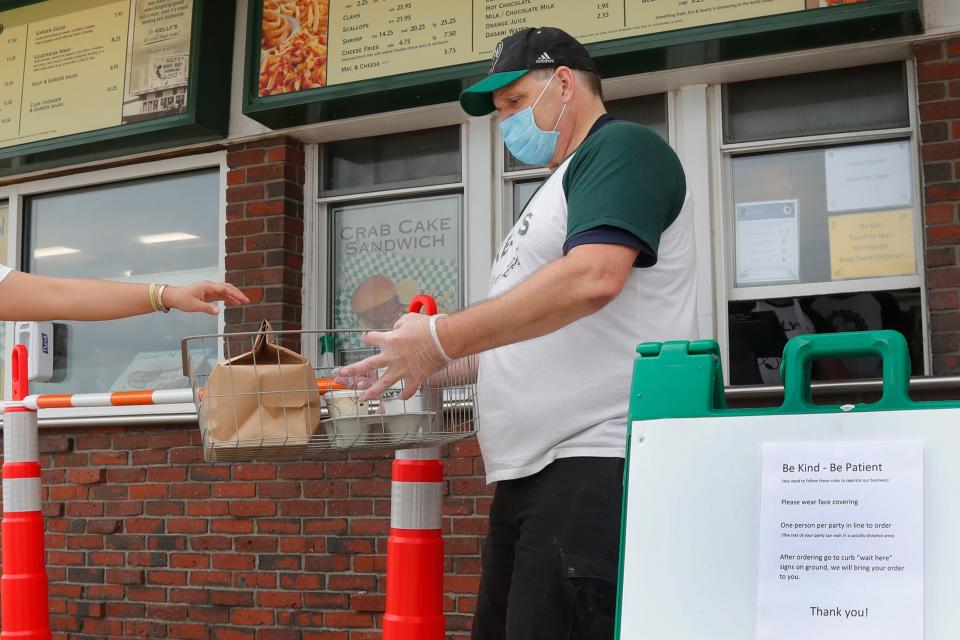
Boston: The next phase in getting the state back in business, including reopening child care centers, could start as soon as Monday if downward trends in the coronavirus pandemic continue, Gov. Charlie Baker said. The official announcement on Phase 2 of the reopening plan will come Saturday, Baker said at a news conference Wednesday. Child care centers, which currently are open only to children of emergency workers, will need to screen staffers and youngsters for symptoms of illness before allowing them in each day. Centers must use only one entrance, stagger drop-off schedules and try to avert close contact between children. At summer camps, attendees will have to stay in their groups, counselors won’t be able to move among groups, and field trips will be banned for now. Retails stores that open their floors in Phase 2 must limit occupancy, require face masks and – for groceries and pharmacies – create special hours for customers older than 60.
Michigan
Lenox Township: More than 100 prisoners in southeastern Michigan were given the wrong results of coronavirus tests, the Corrections Department said. Fifty-four men were told they tested positive while another 54 were told they tested negative at Macomb Correctional Center. The results were actually the reverse, spokesman Chris Gautz said. The mistake led to prisoners subsequently being housed in wrong areas, Gautz said. The Corrections Department recently finished testing the statewide population of 38,000 prisoners. About 10% were infected, and 68 prisoners have died, including five at Macomb. “We were a facility that had one of the largest outbreaks in the state, and you’re still making mistakes like this?” prisoner Jamie Meade said.
Minnesota
St. Paul: Another 29 Minnesotans have died from COVID-19, and 404 more people have tested positive for the disease, according to Thursday’s report from the Minnesota Department of Health. The Benedict Homes assisted living facility in Sherburne Countty was added to the list of congregate care facilities with outbreaks of the virus Thursday. Statewide, the number of people who tested positive for the novel coronavirus reached 26,273 on Thursday, and 1,115 people have died, according to MDH. Of those cases, 3,253 have required hospitalization, and 512 remained hospitalized Thursday. Of those hospitalized, 244 are in intensive care. Across the state, 21,490 coronavirus patients no longer need isolation.
Mississippi
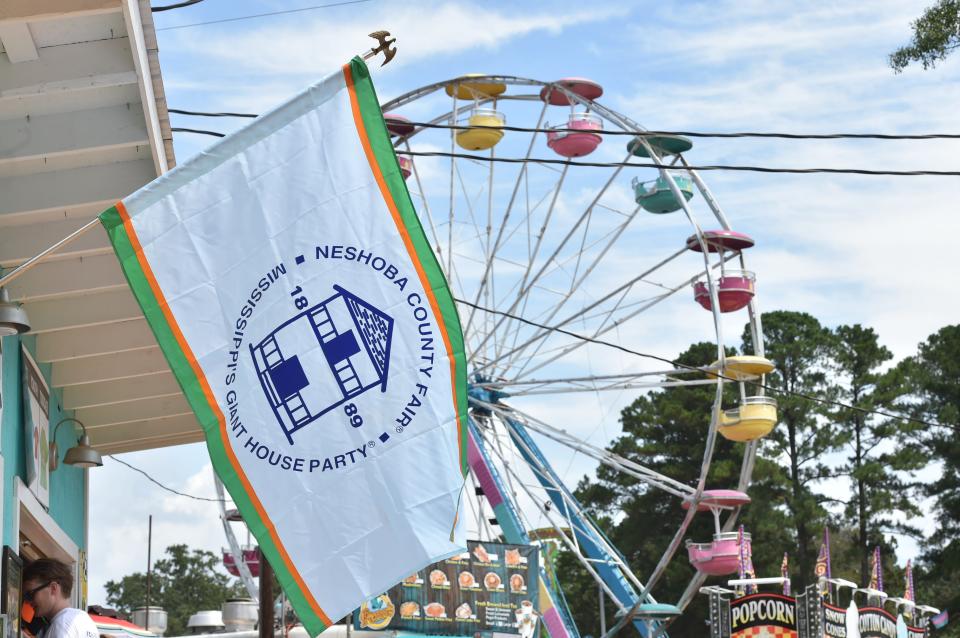
Philadelphia: The 2020 edition of “Mississippi’s Giant Houseparty” is being canceled because of concern about the coronavirus pandemic. Directors of the Neshoba County Fair said in a statement Wednesday that they’ve been consulting with public health officials and determined it would not be possible to ensure that people “safely and effectively” follow guidelines from the Centers for Disease Control. The fair typically attracts tens of thousands of people to the red clay hills of east central Mississippi. Extended groups of families and friends live in cabins on the campgrounds for more than a week, and crowds are even larger on the two days that politicians speak under the main pavilion on the fairgrounds. The fair also has a midway, musical performances and horseracing. The fair dates back to the 1890s and has previously been canceled only during World War II.
Missouri
Osage Beach: No additional cases of the new coronavirus have been reported stemming from the crowded pool parties at Missouri’s Lake of the Ozarks over Memorial Day weekend, the state’s top health official said. Camden County Health Department reported Friday that a person from Boone County who had attended the parties tested positive for the virus. Speaking at a news conference in Jefferson City on Wednesday, Dr. Randall Williams, the director of the Department of Health and Senior Services, said no more cases have been uncovered since, the St. Louis Post-Dispatch reports. Social media postings of the event showed large crowds of mostly young people without masks and not adhering to social distancing guidelines at pools along the central Missouri lake that is a popular weekend getaway spot. The pictures and video of crowds at the lake prompted a public outcry and led health officials to urge anyone who attended the parties to self-quarantine for 14 days.
Montana
Helena: Applications for unemployment payments in Montana declined last week as the state continues to lift closures put in place to prevent the spread of the coronavirus, officials said Thursday. The number of new applications for job assistance submitted in Montana last week fell to 2,874, according to the U.S. Employment and Training Administration. That’s a decrease of nearly 25% from the 3,821 claims filed a week earlier but an increase of nearly 280% from the number of applications submitted at the same time last year. Montana has processed 108,572 claims for unemployment since March 14. That represents 23.8% of the total workforce eligible for the unemployment insurance program. As of May 23, 47,350 Montana residents were receiving unemployment benefits, which is 10.4% of all eligible employees.
Nebraska
Omaha: Six more people have died from the coronavirus in the state, and officials have confirmed 255 new cases, according to the state’s online tracking portal. The number of known cases rose to 14,866, and the number of deaths has reached 187 as of Wednesday night. More than 112,400 people have been tested. Hospital capacity is relatively stable, with 42% of hospital beds, 46% of intensive care unit beds and 75% of ventilators available for use. Gov. Pete Ricketts had been scheduled to answer media questions about the coronavirus Thursday but canceled that plan, saying he was doing so out of respect for the nationally televised memorial service of George Floyd, the black man whose death in Minneapolis police custody has triggered national protests.
Nevada

Carson City: The state has seen more than a month of declining rates of coronavirus-related hospitalizations and positive tests for COVID-19, Gov. Steve Sisolak said Thursday. The governor said in a statement that Nevada has made significant progress meeting five benchmarks he set in late April in order to start easing restrictions on gatherings and business closures. The Democrat said Nevadans who took the threat of the virus seriously helped the state “to slowly begin to reopen its communities and the economy on the path to a new normal.” Nevada has seen the rate of positive COVID-19 cases drop for at least 39 days, with 5.7% of all people having the disease out of everyone tested. The rate of hospitalizations has declined for 43 days, the state has the ability to test patients who don’t show symptoms of the virus, and Nevada has set up a contact tracing system. The state also has the ability to intervene in any outbreaks, and all nursing homes have been inspected.
New Hampshire
Concord: The temporary expansion of telehealth during the coronavirus pandemic would become permanent under a bill considered Thursday by a Senate committee. As passed by the House in March, the bill would allow reimbursement for medication-assisted treatment for substance use disorders conducted via telehealth. But an amendment before the Senate Health and Human Services Committee would also make permanent the provisions of Gov. Chris Sununu’s emergency order on telehealth, which allowed all health care providers to offer services via phone, video and other remote systems and required insurers to cover them. Officials representing hospitals, community health centers, dentists and mental health providers all told the committee that telehealth has been a valuable tool during the pandemic and should continue.
New Jersey
Trenton: Gov. Phil Murphy on Wednesday unveiled and endorsed recommendations on improving nursing homes’ responses to outbreaks after COVID-19 ravaged long-term care facilities in the state. The 100-page report calls for improving nursing homes’ emergency response by consolidating operations for all facilities in a single center. The plan also calls for increasing wages and ensuring access to paid sick leave. The report was compiled by consultants at the firm Manatt, which Murphy’s administration hired for $500,000, according to records obtained under the open records act. New Jersey’s long-term care facilities have been had hit by the outbreak, accounting for nearly half of the state’s fatalities from the virus. Murphy reported Wednesday that there were 5,076 lab-confirmed deaths among residents and staff at long-term care facilities.
New Mexico
Santa Fe: State health officials say they have confirmed 25 more coronavirus cases among federal inmates being held at a lockup in southern New Mexico. The state Health Department on Wednesday said the cases from the prison in Otero County brought the statewide total to 8,140. More than 160 state inmates being held at the same facility also have tested positive. The state also reported eight additional deaths – all from McKinley and San Juan counties. Those areas have been hit the hardest and account for more than half of New Mexico’s infections. More than 40 long-term care and acute care facilities around the state also have reported at least one case among residents and staff over the past month.
New York
New York: The state began to allow outdoor dining at restaurants as soon as Thursday in much of the state outside of New York City and its suburbs as coronavirus restrictions ease, after Gov. Andrew Cuomo announced the move Wednesday. Restaurants must place outdoor tables 6 feet apart, all staff must wear face coverings, and customers must also wear a covering when not seated, under the rules Cuomo announced in a news release. The order applies to regions that have entered the second phase of Cuomo’s four-step reopening plan, including the Capital region, western New York, central New York and the Finger Lakes. The areas that will have to wait for outdoor dining include Long Island and the mid-Hudson Valley, which entered the first phase of reopening last week, and New York City, which is scheduled to enter the first phase next week.
North Carolina
Raleigh: The General Assembly wants to let more young people begin driving on their own even though the North Carolina DMV isn’t currently offering required behind-the-wheel tests due to COVID-19 health worries. The full House and a Senate committee approved separate measures Wednesday that would set aside the behind-the-wheel test for teenagers seeking a limited provisional license and help ease a bottleneck of applicants. A young person still must log 60 hours of driving with a parent to seek such a permit. The House bill would waive the road-test mandate for these youths until the Division of Motor Vehicles administered them again or for six months, whichever date is later. A legislative lobbyist for the Department of Transportation, which oversees the DMV, told House Rules Committee members that the agency supported the waiver.
North Dakota
Bismarck: Health officials said Thursday that 27 additional people have tested positive for COVID-19 in the state, bringing its total to 2,706 cases. North Dakota has confirmed 66 deaths from complications of the coronavirus, but none were reported Thursday. Officials said 1,242 people have been screened since Wednesday, bringing the total tested in North Dakota to 104,888. Twenty of the positive cases reported Thursday were in Cass County, which has been the epicenter of the state’s coronavirus outbreak. They county that contains Fargo now has a total of 1,803 confirmed cases. Thirty-two people were hospitalized Thursday, down two from the day before.
Ohio
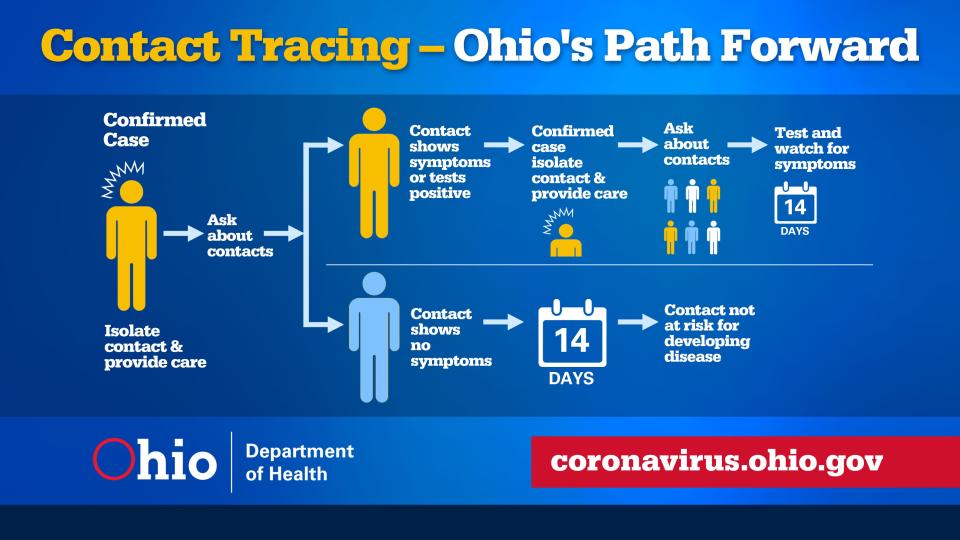
Columbus: A proposal by House Republicans to require individuals’ written consent for the state to track the spread of the coronavirus was rejected by fellow Republicans in the Ohio Senate on Wednesday. The House would have required in-writing permission before the Health Department could undertake what is known as contact tracing. This technique allows investigators to reach out to people who have been in close and recent proximity to someone who tests positive for COVID-19. The proposal reflected the disagreement many conservative House Republicans have with GOP Gov. Mike DeWine’s response to the coronavirus, which they feel has gone too far. But Senate Republicans joined by Democrats said the proposal itself went too far and could rule out people willing to allow the tracing but unable to sign a form if, for example, they were out of town. Contact tracing is considered essential to tracking a contagious illness as a means of slowing it down.
Oklahoma
Oklahoma City: The Oklahoma State Department of Health on Wednesday reversed course on its decision from earlier this week to no longer release COVID-19 infection data by city and zip code. The agency made the move after consulting with Attorney General Mike Hunter, who advised them releasing epidemiological information for statistical purposes is legal as long as no individual person can be identified. Hunter said in a statement that the release of the more detailed infection data by locality “threads the needle of providing up-to-date information to the public while protecting the privacy of Oklahomans.” Lawyers for the health department and the governor’s office had made a decision earlier this week to no longer release the data because of state medical privacy laws. They claimed they had previously been able to release the data under the expired Catastrophic Health Emergency Powers Act.
Oregon
Portland: The state hasn’t seen a coronavirus resurgence in the weeks since most counties began to slowly reopen businesses, the state’s top health official said Wednesday. Oregon Health Authority Director Patrick Allen spoke of declining hospitalizations and infection rates as evidence that the spread of COVID-19 remains mild, even as new reported cases increased slightly in recent days, The Oregonian/OregonLive reports. Allen credited Oregonians for taking steps to reduce their risk of infection, such as wearing face coverings in public and continuing to practice social distancing. “I think it’s safe to say our situation is stable,” he said in a news conference with Gov. Kate Brown. “As stores, salons and restaurants have reopened across the state, COVID-19 has not reemerged with renewed ferocity.” Throughout the pandemic, Oregon has had one of the nation’s lowest infection and death rates among known cases.
Pennsylvania
Harrisburg: The coronavirus has infected another 537 people and killed another 75 in Pennsylvania, the state Health Department said Thursday, even as the rate of new cases and the percentage of those testing positive continues to decline. The agency said it has now confirmed nearly 74,000 cases and a total of 5,817 deaths because of the virus in Pennsylvania in the past three months. On Friday, Gov. Tom Wolf’s administration is expected to lift more restrictions, as it previously announced it would. Nearly 6 million people in Philadelphia and seven other counties in hard-hit southeastern Pennsylvania are scheduled Friday to become the last in the state to shed the tightest restrictions under Wolf’s stoplight-colored three-phase reopening plan. That includes the stay-at-home order that is part of the so-called red phase.
Rhode Island
Providence: State Department of Health staff will be posted to all future peaceful protests seeking justice in the death of George Floyd to help reduce the chances that the coronavirus spreads at them, Gov. Gina Raimondo said Wednesday. The staff will distribute masks and provide information about symptom monitoring and how to get tested, the Democratic governor said. Raimondo said while she supports the constitutional rights of people to demonstrate, she is concerned about large gatherings leading to an outbreak of the disease. “I feel like these protests should be allowed to occur … so that people can participate in democracy and advocate for change,” she said. “Having said that, it doesn’t mean that we can forget that the virus still with us.” She also asked protesters to think of their families, especially if they live with any older, vulnerable relatives.
South Carolina
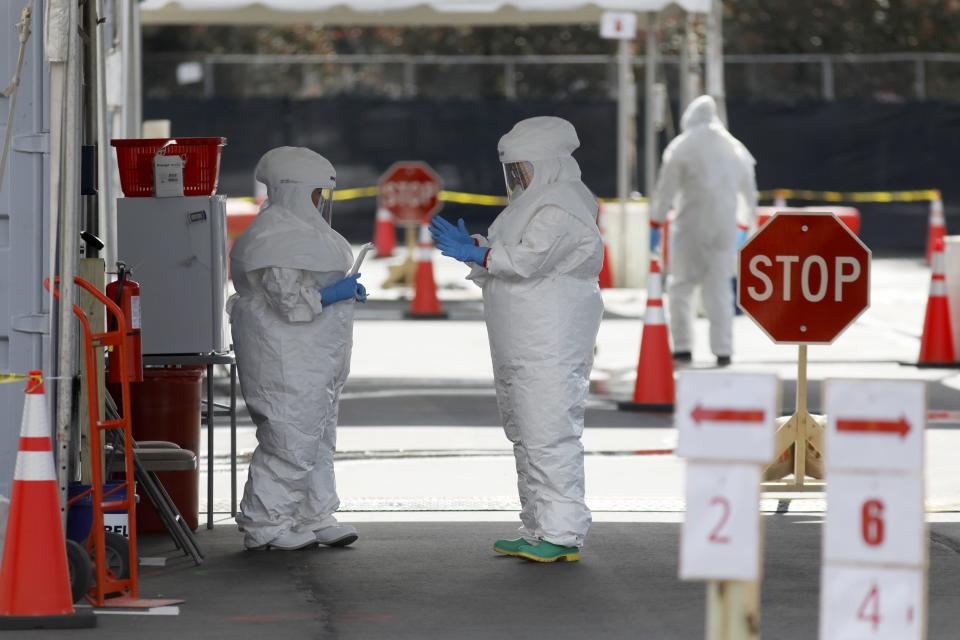
Columbia: State health officials issued a warning Wednesday that people who go to graduations, businesses or other recently opened places and aren’t careful about wearing masks or social distancing may be contributing to an increase in COVID-19 cases in the state. But they also said the state likely won’t shut down businesses again, saying damaging the economy doesn’t help anyone. People need to take responsibility for their own safety, they said. For the past week, health officials had mostly blamed a significant increase in testing for the spiked numbers. But the messaging changed Wednesday. They cited people not taking precautions at graduation parties and other large gatherings as a possible contributor and urged people to wash their hands, wear masks in public, keep 6 feet away from others and stay at home when possible. “People are getting pretty comfortable with being out and about and not practicing social distancing and not wearing a mask,” said Dr. Joan Duwve, Director of Public Health for the Department of Health and Environmental Control.
South Dakota
Sioux Falls: The state on Thursday reported two new deaths from COVID-19, bringing its death toll to 64, according to the Department of Health. The state also reported 85 new cases of the virus and has recorded 5,247 cases so far. About 80% of those have recovered, but 86 people are currently hospitalized with COVID-19. Over the past two weeks, the rolling average number of daily new cases has remained mostly constant at about 64 per day. One person who died was in their 60s, and the other was over the age of 80. The economic impacts of the pandemic continued to cause layoffs in the state as 1,435 people made new claims for unemployment benefits in the week ending May 30. But that was a decrease of new claims by more than half from the previous week. A total of 19,593 people in South Dakota were receiving unemployment benefits as of May 23. That represents 4.7% of all eligible employees in the state.
Tennessee
Memphis: The state delivered unemployment payments to more than 314,000 people last week, as the number of new jobless claims continued to run much higher than normal during the response to the new coronavirus outbreak. Stay-at-home orders from Gov. Bill Lee and city and county officials in mid-March led to business closures and hundreds of thousands of layoffs, as officials scrambled to stem the rise of COVID-19. Businesses have begun to gradually reopen in recent weeks, and many workers have been able to return to their jobs. But the number of new weekly filings is still high, with some businesses remaining closed and employers cutting staff as they operate at a limited capacity due to social distancing rules. More than 22,700 new unemployment claims were filed during the week ending Saturday, the Tennessee Department of Labor & Workforce Development said Thursday.
Texas
Austin: Bars, restaurants and retailers will be allowed to serve more customers – in some cases immediately – under new orders from Republican Gov. Greg Abbott on Wednesday to further open the state economy amid the coronavirus pandemic. Abbott’s order for “Phase 3” of the restart also allows for outdoor Fourth of July celebrations of 500 or more at the discretion of local officials. Retailers are allowed to expand to 50% capacity immediately, and the same applies to bars as long as patrons are seated. Restaurants can serve groups as large as 10 and can expand to 75% total capacity starting June 12. The order also allows amusement parks to gradually expand capacity. All are supposed to follow health and social distancing standards recommended by state and federal officials. The new order comes just three days after the state set a single-day high of positive tests. Texas has reported three of its four highest days of positive tests since March within the past week.
Utah
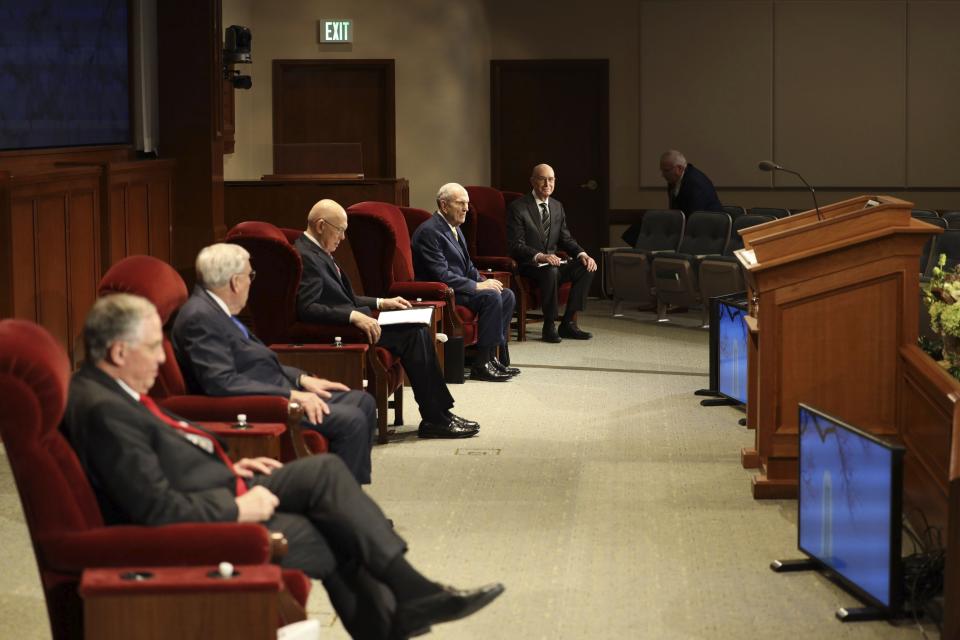
Salt Lake City: The Church of Jesus Christ of Latter-day Saints said Thursday that it will hold its twice-yearly signature conference in October without an in-person audience, as it did in April, because of lingering concerns about the coronavirus pandemic. The conferences usually bring some 100,000 people to the church conference center in Salt Lake City to attend five sessions over two days. Instead, church leaders will be inside a small auditorium with only a few other people Oct. 3-4 as the speeches are broadcast live online around the world. “As a worldwide organization, we have an obligation to be good citizens and to act with caution as it relates to such a unique setting as general conference, which traditionally brings thousands of visitors to Salt Lake City from around the globe,” the church’s top leaders said in a letter to members.
Vermont
Burlington: Testing for COVID-19 is available to college students returning to the University of Vermont and Champlain College. The specimen collection is being done by the Vermont Department of Health with help from trained members of the Vermont National Guard at sites on the UVM campus. Testing for UVM students starts Monday and will continue weekdays through June 16. Champlain College students can get tested on June 9, 11 and 16. The Champlain Student Health Center is coordinating the testing for Champlain students. Testing hours are 9 a.m. to 3 p.m. at all sites. Local residents may also get tested June 3-6 and June 17-19. Appointments are needed for all tests. UVM students may make an appointment through the school’s MyWellbeing secure health information portal. Champlain students can call the student health center to sign up, and area residents can register online.
Virginia
Chincoteague: The town is working with the county to support local businesses hit hard by the novel coronavirus pandemic. At its meeting this week, the town council agreed that hotels, motels, restaurants and other businesses affected by the virus should be given as much support as possible through the federal CARES Act. During the meeting, council members discussed how funding from the CARES Act will be used to support the town. Town manager Mike Tolbert explained that Accomack County will receive money first, and citizens of the county, including Chincoteague, will be able to request funding to assist their business. Tolbert added that nonprofits will not qualify for funding from the CARES Act and that the county’s plan is to work on a first-come, first-serve basis.
Washington
Seattle: The city’s school district says it will soon decide how the next school year will operate given the current coronavirus pandemic. The district moved largely online since it first shut down all buildings March 12 due to the COVID-19 outbreak. Gov. Jay Inslee on April 6 issued an emergency order to keep schools across the state closed through the end of the school year. Washington state’s largest school system, which has about 50,000 students, announced Tuesday that it’s considering three options, including fully remote learning. Seattle Public Schools is also considering an option for the fall that would have children in pre-kindergarten through fifth grade on campus full time, while students in middle and high school would take on an alternating schedule in which they would spend part of their time in-person, and the other part would be remote learning. The third option is for all students to split their time between the classroom and online.
West Virginia
Charleston: About 4,500 West Virginians filed for unemployment aid last week despite the gradual reopening of businesses in the state, according to federal statistics released Thursday. The filings are slightly down from the previous week, though they remain historically high. State officials said they have received 250,000 unemployment claims in the past 10 weeks. West Virginia’s unemployment rate hit 15% in April, the last recorded month. Nationwide, nearly 1.9 million people filed for jobless benefits last week. Thursday’s latest weekly number from the U.S. Department of Labor is still more than double the record high that prevailed before the viral outbreak. Republican Gov. Jim Justice has allowed most businesses to reopen under his phased plan to lift virus restrictions. On Friday, casinos and movie theaters can resume operations. Justice on Thursday also announced that fairs and festivals can begin again July 1.
Wisconsin
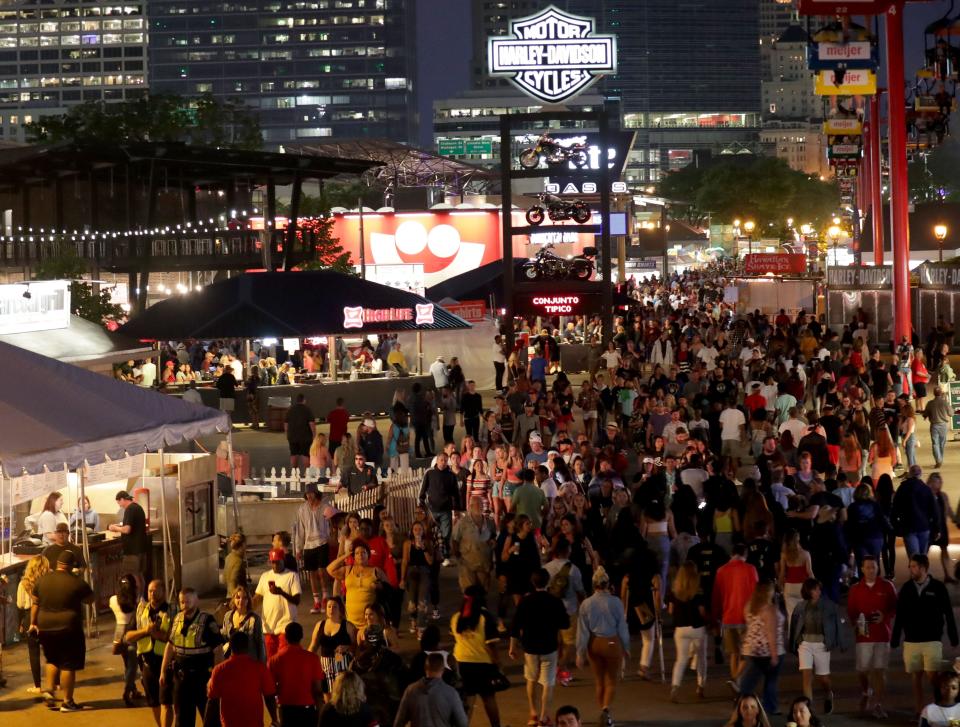
Milwaukee: The lakeside festival that draws hundreds of thousands of people to downtown Milwaukee each summer has canceled the event after earlier moving it to September. Summerfest officials said Thursday that out of an “abundance of caution” for fans, artists, vendors and staff, the event will not take place this year. Summerfest CEO Don Smiley said staff explored numerous options to operate the festival in a safe manner in light of the coronavirus outbreak but could not find acceptable alternatives. Summerfest, which bills itself as the world’s largest music festival, said it has a $186 million economic impact annually. Organizers were to unveil the new $53 million American Family Insurance Amphitheater during the festival this year. Summerfest, which began in 1968, is held at Henry Maier Festival Park, adjacent to Lake Michigan. It draws 800,000 to 900,000 people each summer.
Wyoming
Cheyenne: Applications for temporary unemployment assistance in the state declined during the week ending May 30 as the U.S. economy continued to struggle with measures to contain the coronavirus, officials said Thursday. The number of applications submitted in Wyoming fell to 1,926, down 31% from the previous week but still up 338% compared to the same week last year, according to the U.S. Employment and Training Administration. Wyoming has processed 43,444 claims for unemployment since March 14. That represents 16% of Wyoming’s total workforce eligible for the unemployment insurance program. Wyoming’s fossil-fuel extraction and tourism industries have been especially hard-hit by the coronavirus. Coal companies have laid off or furloughed hundreds of workers amid a decline in demand for electricity. Many restaurants and lodges remain closed.
From USA TODAY Network and wire reports
This article originally appeared on USA TODAY: Fest cancellations, mixed-up results: News from around our 50 states

